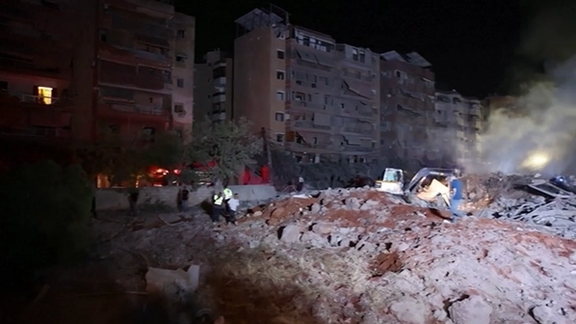The attack was Israel's largest of the vast suburb from which the Iran-backed Shia militant group draws its support in nearly a year of fighting.
The New York Times on Friday evening cited five Israeli officials saying intelligence agencies' initial assessment was that Hezbollah leader Hassan Nasrallah had been killed.
The indications were preliminary and might change, the officials added.
Hezbollah, which has yet to comment on Nasrallah's fate, said it fired missiles at the northern Israeli city of Safed in response.
Iran condemned the bombings without clearly pledging to retaliate directly.
"There is no doubt that this reprehensible crime and reckless behavior represent a serious escalation that changes the rules of the game and brings upon its perpetrator appropriate punishment and discipline," Tehran's embassy in Beirut said on X.
The attack leveled residential buildings in the Haret Hreik neighborhood and preliminary estimates by the Lebanese health ministry reported that two people were killed and 76 injured.
Middle East analyst Ghassan Ashour said Israel's ramped-up attacks have been met with little to no response from Tehran, in a trend which is likely to embolden Israel fruther.
“In case the Islamic Republic decides to retaliate against Israel, it would inevitably draw in the United States and other countries into the war, which is undesirable for Iran," Ashour told Iran International. "Even if Hassan Nasrallah were killed, Tehran would refrain from retaliation.”
"Long arm" of Israel
Further Israeli air strikes in the early hours of Saturday pounded the same south Beirut area after the country's military warned residents to flee certain areas there.
Residents fled the area in droves, according to imagery posted on social media.
Early on Friday, Israeli Prime Minister Benjamin Netanyahu told the United Nations General Assembly that Israel was winning in a multi-front war with Iran.
"There is no place in Iran that the long arm of Israel cannot reach. And that's true of the entire Middle East ... We are winning", Netanyahu said.
The United States said it had no foreknowledge or hand in the attack, President Joe Biden told reporters on Friday.
"We’re still gathering information; I can tell you — the United States had no knowledge of or participation in the IDF action," Biden said, referring to the Israeli military.
The top defense officials of both countries were speaking together on the phone at the time of the attack, Pentagon spokesperson Sabrina Singh told reporters, who declined to elaborate on the contents of their discussion.
Asked about whether Washington approved of Israeli actions or targeted killings, Secretary of State Anthony Blinken said the United States was still examining the intent and effects of the attack.
"What's necessary is to create the conditions, including moving forces back, such that people in both northern Israel and southern Lebanon have the confidence to return home," Blinken said, noting that efforts for a ceasefire and deal to withdraw Hezbollah forces northward were ongoing.
Beginning last week, bombing attacks widely attributed to Israel and air strikes across Lebanon targeting Hezbollah killed over 600 people, ramping up tensions between the Jewish state and an array of Islamist groups Iran arms and funds in the region.
Netanyahu on Thursday appeared to brush off an initiative by the US and other world powers for a 21-day ceasefire between the Jewish state and Iran-backed Hezbollah, saying military operations would continue with "full force".







